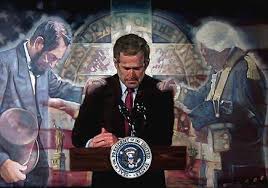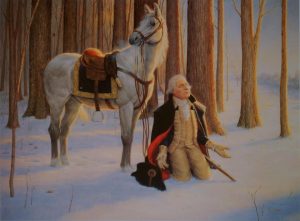I. Memories that Name Who We Are
Yesterday, I attended Heritage Day here in Dayton, which is hosted at Carillon Historical Park. This pretty cool historical park dedicates itself to commemorating great inventiveness in Dayton. Key figures include, of course, the Wright Brothers, but also the inventors of the cash register, Huffy bicycles, the pop top can, and more. Our most well-known poet, Paul Laurence Dunbar, is commemorated here. The park also includes a great deal of living history – an 1850s style brew pub that brews beer using 19th century methods, a still-operating 1930s printing press, a school building from 1896 where people can experience writing problems on slate boards and keeping a pot-bellied stove going, and the old Newcom Tavern that used to welcome visitors to Dayton, but also served as the county courthouse for a time.
Heritage Day celebrates all those things but sets them against the backdrop of Memorial Day. The event concludes with the Dayton Philharmonic Orchestra playing a range of patriotic music, from “God Bless the USA” to the 1812 Overture. The implication: none of the inventiveness, none of the poetry, none of the persistence of early pioneers exists without the fact that there are people who fought for our right to do these things, and that so many of them lost their lives, and we will commemorate that on this Memorial Day Weekend.
I rather like the kind of picture that is portrayed here. I’m invited to become an inventor, too, and to make this city a great place to be, just like the people who have come here before me. That means I am also necessarily invited to imagine myself in the context of America. I can easily do that. I’m the descendent of two people who arrived here on the Mayflower, of countless soldiers who fought in the Revolutionary War, of the Continental Army’s treasurer. We celebrated the immigrants in my family who came from Germany and Norway and who found a better life in the farmland here – that narrative, too, became part of our collective vision of what it means to be an American and to be part of this family. My grandfather fought in World War II, and I still remember at his funeral how my grandmother received a flag commemorating his service, and how much she treasured that flag.
II. Memories that Obscure Who We Are
I’m reminded that a year ago, I was not in the USA but teaching abroad in the Republic of Ireland. While we were in Dublin, we heard a lecture from Mike Cronin of Boston College-Ireland (here’s a sampling of a different public lecture of his that mentions some similar points) who spoke about commemoration. What gets revealed and concealed by our memories, he asked us.
We had just been to the General Post Office museum in Dublin, a place that commemorated the 1916 Easter Rising, the site of a few thousand Irish men and women rebelling against English rule and hoping to establish an Irish republic. The rising lasted for six days. We would later visit Kilmainham Gaol, where the leaders of the Rising were systemically executed – until the English realized that their punishment was perhaps inciting more sympathy for the rebellers’ cause than they had had during the Rising itself. The Rising gave momentum to what, eventually, became the Republic of Ireland in the south, and a partitioned Northern (more Protestant) Ireland that remained part of the UK.
There is, obviously, so much history I’m leaving out here (and ironically for this post, obscuring) – but one of the main points that Cronin emphasized to me and my students was asking them to see what is left out in each commemorative event. Commemoration often overly simplifies, and doesn’t enable the spectator to get the full sense of life. As Cronin observes elsewhere about how the 1916 Rising might be commemorated by various entities:
I can make some predictions. In the UK, the focus of the state will be in remembering WWI—a potentially political useful tool for David Cameron as he campaigns in and around the European issue, where tales of plucky little Britain in the face of chaotic Europe a hundred years ago will create relevant contemporary rhetoric. In Northern Ireland, the spirit of the Belfast Agreement and enforced power-sharing between Unionists and Sinn Féin will allow for the marking of both WWI and the Irish revolution, but these will take place in largely separate spheres. While it is a positive step that the 1916 Rising might be freely celebrated in Northern Ireland, the absence of all but a few symbolic Unionist politicians in attendance will result in official events that are isolated from each other. And in the Republic, the involvement of Irish men and women in WWI will be brought to the fore—but any ceremony that might be mounted at the nation’s war memorial will be dwarfed, I would suggest, by the scale of what is staged to remember Easter Week. As with the North, there will be a move to embracing the range of experiences and choices that were made a century ago, but this will not happen with parity of esteem. The “official” national story will always outrank the ‘lesser’ stories that were marginalized by events from 1916–23.
Cronin goes on to note, for example, that as many Irish as Australians lost their lives at Gallipoli (February 1915-January 1916) in World War I, yet only Australia commemorates those deaths with a central holiday on their calendar. Thus: “Until the Irish narrative is reconfigured to see Gallipoli on a par with Easter Week then, I would suggest, the political understanding and performative celebration of the decade of centenaries will always favor the Irish story of rebellion over the story of what the Irish people did during the period. ”
What stories are obscured by our commemoration? The key thing to note here is that Cronin isn’t even trying to get us to acknowledge other peoples’ stories – he’s noting that we don’t know the complexities of our own stories, because only the one narrative will do. What will we not know, nor even be able to know, because some commemorations drown out others?
He concluded his lecture with a look at a contemporary Irish tourism video, which emphasized diversity. Immigrants from everywhere on the globe appeared in the video, as did a woman Anglican priest – and of course lots of beautiful images of the country side. But nothing of Catholics versus Protestants, nothing of the bloody history that enveloped the island in the latter half of the twentieth century, nor of the great prejudice and bias that existed, nothing of the hard feelings and shame about the Catholic Church, with its sex abuse crisis, its Magdalene Laundries, and so forth. What is being said and being hidden, often quite deliberately, in our commemorations?
So I think of myself and my history and points where I wonder about what’s been obscured. Race doesn’t appear in my family narrative – but I know it must be there in some fashion. Even in the North, where my family seems to have been, you don’t escape from race in America. But my family narrative, too, is merely a mirror of broader American stories.
I think of how our athletes who have chosen to bend the knee at the national anthem rather than stand have been excoriated for their actions. It has seemed so crazy to me because in my family, and in my nation, so far as I had always been told and schooled, kneeling has always been a respectful prayer posture, and freedom of speech and protest has always been a valued activity.
After all:
Oppression of black people and, by extension, all people of color was also something that we commemorated in school. I remember coloring Martin Luther King Jr pictures in kindergarten (in the 80s) and learning about justice in the civil rights movement. The memory my husband and I remember being told was something like: There was the Civil War, which freed all these slaves who had been unjustly treated. And then there was the Civil Rights Movement, which helped obliterate all the injustices of segregation. And now, look! We can be one big happy. Progress!
It becomes clear that another narrative remained hidden underneath the one we were told. Because now, for so many, taking the knee in protest of violence and oppression against people of color is just simply an unpatriotic act.
III. MacIntyre on Patriotism
Alasdair MacIntyre offers a way to think about the conflict I’ve identified above in patriotism and ideals in his famous lecture “Is Patriotism a Virtue?” In this lecture from 1984, he suggested that there were two poles, along a spectrum of views, for understanding patriotism. Thirty-four years on, I still find it a helpful way to think about our present moment.
One pole is the liberal moralism pole. From this pole, MacIntyre suggests that “to judge from a moral standpoint is to judge impersonally.” We are free to pursue our own interests unless and until those interests butt up against a set of impersonal moral standards. We can be patriotic for our country up to the point that we transgress rules that any rational person would say should be a moral rule, regardless of that person’s own self interests.
The other pole is the patriotism as a virtue pole. MacIntyre writes:
Patriotism… is defined in terms of a kind of loyalty to a particular nation which only those possessing that particular nationality can exhibit…. Patriotism is not to be confused with a mindless loyalty to one’s own particular nation which has no regard at all for the characteristics of that particular nation. Patriotism does generally and characteristically involve a peculiar regard not just for one’s own nation, but for the particular characteristics and merits and achievements of one’s own nation.
“Where” and “from whom” I learn moral rules matters, and so patriotism also matters. I learn the particular virtues of American society from this particular country, and from my family: to be hard-working, to love freedom and equality, to be concerned with justice, and so on.
MacIntyre goes on to note the chief difficulties with each of these poles. With patriotism, the danger is in privileging country to the point that some dastardly deed is excused, overlooked, or even supported and sustained. He gives the case of Adam von Trott, someone who decided to try taking down Naziism from within, rather than trying to overthrow the government from without – which meant that Trott was supporting Nazi actions and principles.
The difficulty with the liberal moral position, as MacIntyre writes, is:
what needs to be said is that the liberal morality of impartiality and impersonality turns out also to be a morally dangerous phenomenon in an interestingly corresponding way. For suppose the bonds of patriotism to be dissolved: would liberal morality be able to provide anything adequately substantial in its place? What the morality of patriotism at its best provides is a clear account of and justification for the particular bonds and loyalties which form so much of the substance of the moral life. It does so by underlining the moral importance of the different members of a group acknowledging a shared history… The problem [with liberal morality of impartiality] is that some motivation has to be provided for allegiance to the standards of impartiality and impersonality which both has rational justification and can outweigh the considerations provided by interest.
That is to say, a country can’t have an effective standing army when there is no sense of patriotism that unites its soldiers. As MacIntyre has it: “that is to say, good soldiers may not be liberals and must indeed embody in their actions a good deal at least of the morality of patriotism. So the political survival of any polity in which liberal morality had secured large-scale allegiance would depend upon there still being enough young men and women who rejected that liberal morality.”
What MacIntyre finds is that, in fact, each side lobs a mirror complaint against the other. Patriotism runs the risk of placing “our ties to our nation beyond rational criticism” while liberal morality runs the risk of destroying our ties to each other due to rational criticism.
At the end of the lecture, MacIntyre suggests that we live with the incoherence of both positions, uncomfortably held in tension. Yet most of us never see the incoherence.
The “bend the knee” movement provides an occasion of some clarity for seeing the incoherence MacIntyre outlines. On the one hand, the values of American liberty and equality are on display in these knees bent, these heads bowed. On the other hand, the protest appears to run into a particular communal account of patriotism, which includes proper respect for military sacrifice, and which must be displayed in our bodies by standing, hand on heart, rather than kneeling. Surely no one present would deny the importance of liberty, equality, and justice. But the question may be how and where one learns those, and the extent to which one sees those as a universal moral principle or a virtue learned in a particular community.
The American ideal of “justice for all” runs head first into histories of racism and oppression. We like the idea of justice; we salute it; so much of our narrative of sending troops all over the world has been in the name of justice and just wars. Yet it would seem that in the case of “bend the knee” our patriotism becomes a means for obscuring and thus continuing racism and oppression. The commemorating that we do on patriotic days like Memorial Day means we also often forget stories like this and this, of black military veterans.
IV. Patriotism, Memory, and, oh yeah, some Catholic Moral Theology
Cronin’s question of what gets obscured when we remember remains significant for me, therefore, on this Memorial Day, as does MacIntyre’s uneasy revelation that we are caught up, collectively, in an incoherent narrative, a tug-of-war between the virtue of patriotism and the liberal ideals that both generate and critique our patriotism and our remembrances.
I don’t think that is unique to America. In fact, I rather think that the church today exists with, and struggles with this kind of incoherence and obscuration. How many Catholics have had to answer some version of the question, “Why are you still Catholic… (after all the sex abuse scandals and the Magdaglene Laundries and the patriarchalism and the hierarchy and the Vatican money scandals etc)?
One response is to aim to cover up/obscure/gloss over serious issues that the Church (and America) faces today, while celebrating the practices, the feelings, the communities that our churches and our country give to us.
Another response is to leave in disgust (or to want to emigrate to Canada), to deplore the sense of justice and be angry – to separate, to be distinct, and in making a distinction between self and community, to claim some moral high ground. I am sure there are other responses; but these might be seen as matching the kinds of poles that MacIntyre names, and certainly the kinds of polarization that I see in social media.
The first response is beneficial in that it acknowledges the real importance of communities and practices. Yet it so obviously omits the stories of the “least of these,” the preferential option for the poor, the care and concern for the marginalized. The second response is important because it speaks a word of truth for communities that need to hear. Yet the second response worries me because it claims moral high ground without also acknowledging that it, too, might have some faults. At least I know that, however poor my community might be, at the least it still holds me accountable to the fact that I don’t always know best, that I might be lying to myself, that I might think I’m seeking justice when in fact I am merely creating a self-sufficient bubble of one.
I am cynical enough not to believe in historical progress. I think that despite ourselves we will still be caught in this kind of tangled web of incoherence. The way to go on is, for this believer, still only God.
Do I gloss over the community too much to say that, despite our contemporary experiences, I find it rather miraculous that through it all, the Eucharist always remains open for me to realize that I am incriminated, that I am not just, that my community is far more than I can realize or imagine? Is it too universalistic an impulse to say that the Eucharist calls upon me to think of all people with a unified vision?
I am sure some will say so. But in this era of intense division, I have not as yet seen another compelling way to go on.
The Eucharist – this meal that is commemoration of the best sort because it is always seeking out the narratives of the people who have been obscured (including the ways I obscure parts of my own story), which invites people to the table whom I would not necessarily think of inviting to my house for dinner, which is the cosmic celebration of all peoples in all times and places – the Eucharist is my way to go on, on this Memorial Day.
That fact, in turn, urges me to remember all those who have died for America, who take the knee in protest of injustice, and to want to uncover those stories that have gone untold.





